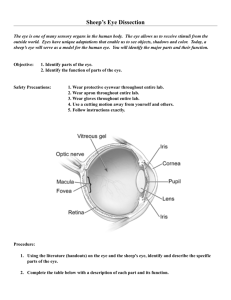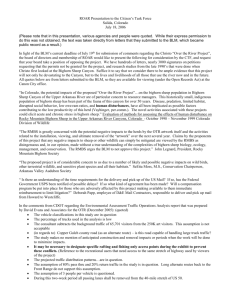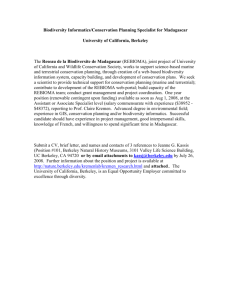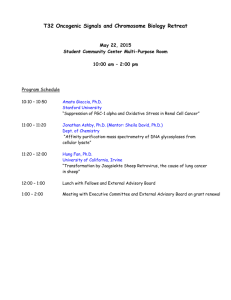Curriculum Vitae - College of Natural Resources
advertisement
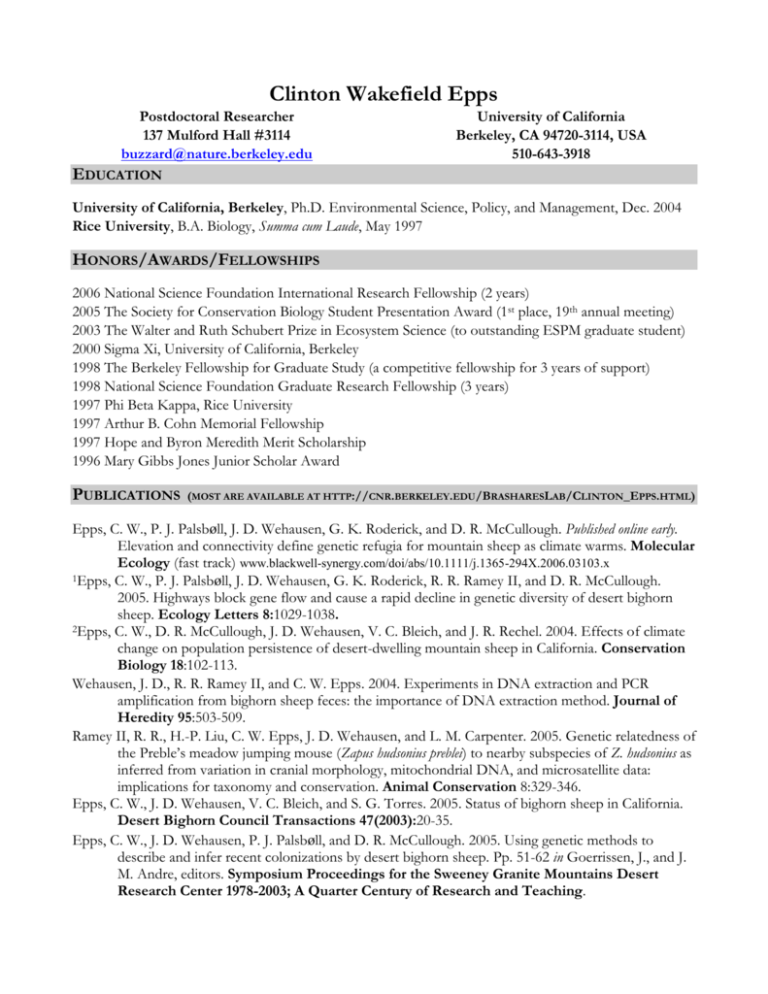
Clinton Wakefield Epps Postdoctoral Researcher 137 Mulford Hall #3114 buzzard@nature.berkeley.edu University of California Berkeley, CA 94720-3114, USA 510-643-3918 EDUCATION University of California, Berkeley, Ph.D. Environmental Science, Policy, and Management, Dec. 2004 Rice University, B.A. Biology, Summa cum Laude, May 1997 HONORS/AWARDS/FELLOWSHIPS 2006 National Science Foundation International Research Fellowship (2 years) 2005 The Society for Conservation Biology Student Presentation Award (1st place, 19th annual meeting) 2003 The Walter and Ruth Schubert Prize in Ecosystem Science (to outstanding ESPM graduate student) 2000 Sigma Xi, University of California, Berkeley 1998 The Berkeley Fellowship for Graduate Study (a competitive fellowship for 3 years of support) 1998 National Science Foundation Graduate Research Fellowship (3 years) 1997 Phi Beta Kappa, Rice University 1997 Arthur B. Cohn Memorial Fellowship 1997 Hope and Byron Meredith Merit Scholarship 1996 Mary Gibbs Jones Junior Scholar Award PUBLICATIONS (MOST ARE AVAILABLE AT HTTP://CNR.BERKELEY.EDU/BRASHARESLAB/CLINTON_EPPS.HTML) Epps, C. W., P. J. Palsbøll, J. D. Wehausen, G. K. Roderick, and D. R. McCullough. Published online early. Elevation and connectivity define genetic refugia for mountain sheep as climate warms. Molecular Ecology (fast track) www.blackwell-synergy.com/doi/abs/10.1111/j.1365-294X.2006.03103.x 1Epps, C. W., P. J. Palsbøll, J. D. Wehausen, G. K. Roderick, R. R. Ramey II, and D. R. McCullough. 2005. Highways block gene flow and cause a rapid decline in genetic diversity of desert bighorn sheep. Ecology Letters 8:1029-1038. 2Epps, C. W., D. R. McCullough, J. D. Wehausen, V. C. Bleich, and J. R. Rechel. 2004. Effects of climate change on population persistence of desert-dwelling mountain sheep in California. Conservation Biology 18:102-113. Wehausen, J. D., R. R. Ramey II, and C. W. Epps. 2004. Experiments in DNA extraction and PCR amplification from bighorn sheep feces: the importance of DNA extraction method. Journal of Heredity 95:503-509. Ramey II, R. R., H.-P. Liu, C. W. Epps, J. D. Wehausen, and L. M. Carpenter. 2005. Genetic relatedness of the Preble’s meadow jumping mouse (Zapus hudsonius preblei) to nearby subspecies of Z. hudsonius as inferred from variation in cranial morphology, mitochondrial DNA, and microsatellite data: implications for taxonomy and conservation. Animal Conservation 8:329-346. Epps, C. W., J. D. Wehausen, V. C. Bleich, and S. G. Torres. 2005. Status of bighorn sheep in California. Desert Bighorn Council Transactions 47(2003):20-35. Epps, C. W., J. D. Wehausen, P. J. Palsbøll, and D. R. McCullough. 2005. Using genetic methods to describe and infer recent colonizations by desert bighorn sheep. Pp. 51-62 in Goerrissen, J., and J. M. Andre, editors. Symposium Proceedings for the Sweeney Granite Mountains Desert Research Center 1978-2003; A Quarter Century of Research and Teaching. Ramey, R. R. II, J. D. Wehausen, H.-P. Liu, C. W. Epps, L. M. Carpenter. 2006. Should hypothesis testing or selective posthoc interpretation of results guide the allocation of conservation effort? Animal Conservation 9:244-247. 1Featured in Conservation Biology in Practice 7(1):10-11; American Museum of Natural History 11-21-05 Science Bulletin “Highways block bighorn sheep” at http://sciencebulletins.amnh.org/bio/s/bighorn.20051121/ 2Featured in “Climate warming shakes up species”, BioScience 54(8): 722-729; “Mystery of the missing megafauna”, Berkeley Science Review 5(2):30-40. MANUSCRIPTS SUBMITTED OR IN PREPARATION (COPIES AVAILABLE ON REQUEST) Epps, C. W., J. D. Wehausen, and D. R. McCullough. In revision. Climate variation, diet quality, and population extinction of desert bighorn sheep. Journal of Applied Ecology. Epps, C. W., J. D. Wehausen, V. C. Bleich, S. G. Torres, and J. S. Brashares. In review. Optimizing dispersal and corridor models using landscape genetics. Journal of Applied Ecology. Brashares, J. S., and C. W. Epps. In prep. Holes in the umbrella? A test of focal-species approaches using mammal time-series from Ghana. To be submitted to Conservation Biology. RESEARCH GRANTS 2007 National Science Foundation International Research Fellowship: $131,596 2006 California Dept. of Fish and Game, Resources Assessment Program: $49,977 2004 Dept. of Environmental Science, Policy, and Management Travel Fellowship: $400 2003 Safari Club International: $5000 2003 Dept. of Environmental Science, Policy, and Management Travel Fellowship: $1220 2002 Dept. of Environmental Science, Policy, and Management Travel Fellowship: $900 2001 Safari Club International: $5000 2000 Safari Club International: $3500 2000 Berkeley Chapter of Sigma Xi, Grant-in-Aid-for-Research: $200 PROFESSIONAL EXPERIENCE National Science Foundation International Research Fellow, Sokoine University of Agriculture (Tanzania)/University of California, Aug 2006-present (with Profs. B. Mutayoba and J. Brashares) Postdoctoral Researcher, Dept. of ESPM, UC Berkeley, June 2005- present (with Dr. Justin Brashares) Graduate Student Researcher, Dept. of ESPM, UC Berkeley, September 2003-December 2004 Researcher, California Dept. of Fish and Game, September 2001-May 2005 Member of Graduate Programs/Graduate Admissions Committee, Dept. of ESPM, spring 2004 Member of Faculty Search Committee, Dept. of ESPM-Wildlife, spring 2003 Biologist for Projeto Karib, Pará, Brazil, May-October 1997 Field assistant, U.S. Forest Service, Elkins, West Virginia, May-August 1996 CONFERENCE ABSTRACTS (SELECTED) Epps, C. W., P. J. Palsbøll, J. D. Wehausen, G. K. Roderick, and D. R. McCullough. 2006. Elevation and connectivity define genetic refugia for mountain sheep as climate warms. 20th Annual Meeting of the Society for Conservation Biology, San Jose, USA. Epps, C. W., P. J. Palsbøll, J. D. Wehausen, G. K. Roderick, R. R. Ramey II, and D. R. McCullough. 2005. Major highways block gene flow and decrease genetic diversity of desert bighorn sheep. 19th Annual Meeting of the Society for Conservation Biology, Brasilia, Brazil. Epps, C. W., J. D. Wehausen, P. J. Palsbøll, and D. R. McCullough. 2005. Using genetic analyses to describe and infer recent colonizations by desert bighorn sheep. 48th Meeting of the Desert Bighorn Council, Alpine, Texas. Epps, C. W., J. D. Wehausen, and D. R. McCullough. 2005. Linking climate change and population extinction: how precipitation, elevation, and temperature affect diet quality of desert bighorn sheep. Annual Conference of the Western Section of the Wildlife Society, Sacramento, California. Epps, C. W., D. R. McCullough, J. D. Wehausen, V. C. Bleich, and J. R. Rechel. 2003. Effects of climate change on population persistence of desert-dwelling mountain sheep in California. 17th Annual Meeting of the Society for Conservation Biology, Duluth, Minnesota. Epps, C. W. 2002. Using fecal DNA to examine dispersal and gene flow between populations of desert bighorn sheep. 16th Annual Meeting of the Society for Conservation Biology, Canterbury, England. Epps, C. W., D. R. McCullough, J. D. Wehausen, V. C. Bleich, and J. R. Rechel. 2000. Climate change and the desert bighorn sheep Ovis canadensis nelsoni. Annual Conference of the Western Section of the Wildlife Society, Riverside, California. INVITED TALKS AND PANEL DISCUSSIONS (SELECTED) Reconciling Conservation Planning and Transportation Planning on a Regional Scale. North American Section of Society for Conservation Biology/ICOET Joint Symposium, May 25-27, 2007 (upcoming). Genetics and Management Symposium, Northern Wild Sheep and Goat Conference, Kananaskis, Alberta, Canada, April 2006. Golden Gate Chapter Meeting of Safari Club International, November 2002 and April 2004. UC San Diego White Mountain Research Station “Super-Course” on Conservation Biology, August 2000. TEACHING Guest lecturer in Mammalogy, Population Viability Analysis, Wildlife Ecology, at UC Berkeley, 2001-2006 Graduate Student Instructor, Conservation Biology, UC Berkeley, January-May 2000 Teaching Assistant, Introductory Ecology Lab, Rice University, 5 semesters 1995-1997 PROFESSIONAL ACTIVITIES AND SERVICE Member: Society for Conservation Biology Sigma Xi Phi Beta Kappa The Wildlife Society Desert Bighorn Council Berkeley Chapter of the Society for Conservation Biology (Treasurer 1999-2000) Manuscript Reviewer: Nature, Ecology Letters, California Fish and Game, Journal of Wildlife Management, Conservation Genetics, Journal of Applied Ecology, Molecular Ecology RESEARCH PROJECTS “Past and present connectivity of wildlife populations in Tanzania, East Africa”: postdoctoral research as a National Science Foundation International Research Fellow with Dr. Justin Brashares of University of California and Prof. Benezeth Mutayoba of Sokoine University of Agriculture, Tanzania; examining connectivity of ungulate populations using genetic and transect survey methods. July 2006 – present. “Determining critical linkages for desert bighorn sheep populations”: postdoctoral research at University of California, Berkeley, in collaboration with California Dept. of Fish and Game, using genetic data to develop models of bighorn sheep dispersal and connectivity with management application. May 2005 – present. “Management of an introduced population of desert bighorn sheep on Isla el Carmen, Baja Sur, Mexico”: census and management of a population of desert bighorn sheep serving as reintroduction stock for Baja Sur, with Dr. Rob Roy Ramey II, Dr. John D. Wehausen, and the biologists of “Ovis”. “Population processes in a changing climate: extinction, dispersal, and metapopulation dynamics of desert bighorn sheep in California.” Ph.D. Dissertation, University of California, Berkeley, with Dr. Dale R. McCullough, Dr. Per Palsboll, Dr. George Roderick, and Dr. James Patton. Aug. 1998 – Dec. 2004 “Ornithological names in the Kaxuiana, Wayana, Tirio, and Apalai languages.” Parque de Tumucamaque, Para, Brazil, with Dr. S. Gildea of Projeto Karib, Rice University. May 1997 – Oct. 1997 “Evaluation of black bear Ursus americanus habitat in the Big Thicket National Preserve, Texas.” Undergraduate Honors Thesis, Rice University, with Dr. Paul Harcombe. Sept. 1996 – May 1997 “Effects of parasites on secondary sex characters of the great-tailed grackle Quiscalus mexicanus.” Independent research with Dr. Kris Johnson, Rice University. Sept. 1995 – Dec. 1995
